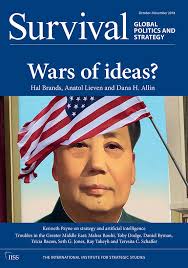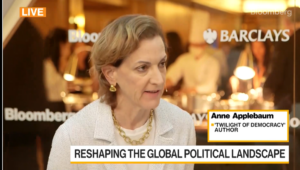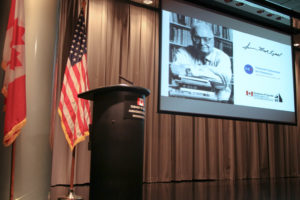Group of Seven foreign ministers gathered on Thursday to weigh how to support Ukraine through the winter in the face of Russian attacks on its power grid as well as deal with China’s growing assertiveness and Iran’s crackdown on protests, Reuters reports.
“G7 partners will now together kick off winter aid for Ukraine,” German Foreign Minister Annalena Baerbock said at the opening of the event. “We will not allow lots of people – the elderly, children, teenagers, families – to die from hunger or cold over the upcoming winter months due to the brutal tactics of the Russian president.”
 But concerns that Germany is again prioritizing economic interests in its relations with an increasingly authoritarian China (see below) are likely to surface during the meeting.
But concerns that Germany is again prioritizing economic interests in its relations with an increasingly authoritarian China (see below) are likely to surface during the meeting.
There is an ongoing battle of ideas between free, democratic nations and authoritarian regimes, including in the field of technology, NATO Deputy Secretary General Mircea Geoana told the Prague Cyber Security Conference.
But that ideological conflict is complicated by the emergence of illiberal and authoritarian tendencies within leading democracies.
Political leaders are “slowly destroying” institutions that curtail their authority through checks and balances in democracies as well as autocracies, historian Anne Applebaum told Bloomberg’s Global Geopolitics. The danger is that we also lose the power to predict leaders’ behavior as regimes become more opaque, as demonstrated by the treatment of China’s former leader Hu Jintao at the recent CCP Congress.
As a result of his purging and demotion of officials who might not support his hard-line policies and his promotion of loyalists and “wolf warrior” diplomats, Xi, like other totalitarian leaders, is becoming more isolated from contrary views, the Post’s Josh Rogin adds. This could make him more detached from reality and therefore more likely to do something risky or dangerous, Taiwan’s analysis goes.
 It will take a clear, consistent collaborative effort amongst the world’s democracy experts, activists, and leaders to push back against Autocracy Inc.’s global network of authoritarian leaders, says Applebaum. Democratic forces should follow the example set by authoritarian rivals by working together to support each other through various means such as business deals, economic cooperation, or technological support, she told last week’s 11th Global Assembly of the World Movement for Democracy.
It will take a clear, consistent collaborative effort amongst the world’s democracy experts, activists, and leaders to push back against Autocracy Inc.’s global network of authoritarian leaders, says Applebaum. Democratic forces should follow the example set by authoritarian rivals by working together to support each other through various means such as business deals, economic cooperation, or technological support, she told last week’s 11th Global Assembly of the World Movement for Democracy.
But German Chancellor Olaf Scholz’s trip to Beijing on Friday is raising concerns among democratic allies about his ability to deliver a clear, coherent message on where his country and the broader West stand, the Post reports.

National Endowment for Democracy (NED)
Six German government ministries voiced objections last month to a deal allowing Chinese shipping giant Cosco to buy a stake in a port terminal in the northern city of Hamburg, it adds. Germany’s intelligence chiefs also issued stark public warnings about the dangers of Chinese investment in the country’s infrastructure and businesses. “Russia is the storm, but China is climate change,” said the head of domestic intelligence, Thomas Haldenwang.
The Financial Action Task Force (FATF) is the most powerful organization you’ve never heard of, says Stephen Reimer of the Centre for Financial Crime and Security Studies at the Royal United Services Institute (RUSI).
Nicaragua’s autocratic government isn’t the only regime to have stumbled upon the FATF standards as a useful tool for targeting its critics, he adds. Misuse is also seen in stable democracies like Canada, where anti-money laundering (AML), counterterrorist financing (CTF) measures have been deployed to manage issues of law and order that have nothing to do with preventing money laundering or terrorism financing. Within the Centre for Financial Crime and Security Studies at RUSI, we refer to these instances of intentional weaponization as ‘Authoritarian Abuses’ of the FATF’s anti-financial crime standards.
 The Embassy of Canada and the National Endowment for Democracy invite you to the nineteenth annual Seymour Martin Lipset Lecture on Democracy in the World, featuring Anne Applebaum, Staff Writer, The Atlantic; Pulitzer Prize-winning Historian; Senior Fellow, Johns Hopkins School of Advanced International Studies on Autocracy Inc.: How the World’s Authoritarians Work Together. Followed by a conversation with William J. Dobson, coeditor of the Journal of Democracy.
The Embassy of Canada and the National Endowment for Democracy invite you to the nineteenth annual Seymour Martin Lipset Lecture on Democracy in the World, featuring Anne Applebaum, Staff Writer, The Atlantic; Pulitzer Prize-winning Historian; Senior Fellow, Johns Hopkins School of Advanced International Studies on Autocracy Inc.: How the World’s Authoritarians Work Together. Followed by a conversation with William J. Dobson, coeditor of the Journal of Democracy.
THURSDAY, DECEMBER 1, 2022. 6:00 P.M. EASTERN TIME
The Embassy of Canada, 501 Pennsylvania Avenue, NW, Washington, DC. Reception to follow from 7:30—8:30 pm.
There are a limited number of seats for in-person attendance of this event, and they will be awarded on a first come, first serve basis. The event will also be livestreamed. RSVP to attend in-person or to receive livestream information. All participants must register in advance to attend and will receive instructions prior to the event.
Rising #authoritarianism and repression of women are “mutually reinforcing ills,” say @Kennedy_School Professor and @JoDemocracy contributor @EricaChenoweth and #ZoeMarks https://t.co/oBLi5Gi2ML
— Democracy Digest (@demdigest) November 3, 2022







